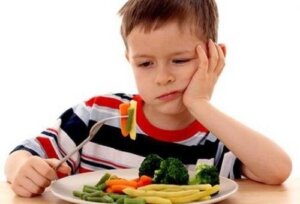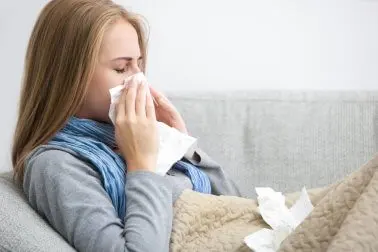Discover the Main Causes of a Loss of Appetite


Written and verified by the pedagogue in physical education and nutritionist Elisa Morales Lupayante
There can be many possible causes of a loss of appetite. There are even people who become disgusted by the thought of food almost overnight. Mealtimes become a real problem because nothing appeals to them.
You should pay close attention to be able to identify the causes of your loss of appetite and see a doctor. That way, you will be able to consult with the specialist so that together you can find the solution to your problem.
What is a loss of appetite?
A loss of appetite is characterized by a sudden or progressive decrease in the desire to eat. From a medical point of view, this condition is known as hyporexia or inappetence. It may be temporary or accompany the person for a long time.
In the case that the lack of appetite is prolonged and is done to achieve substantial weight loss, the medical term to define it is anorexia. This problem can occur as a result of various physical and psychological health problems.
The consequences of a loss of appetite on the human body
In general, a loss of appetite in individual cases does not have serious consequences. However, hyporexia, when sustained over time, could lead to other underlying diseases associated with being underweight and malnutrition. Among the most common consequences are the following:
- Immune system depression
- Malnutrition
- Loss of weight and muscle mass
- Weakness and fatigue
- Nausea and dizziness
- An altered state of consciousness
A study published in the Journal of Nutrition and Metabolism points out that, in older people, lack of appetite results in them becoming immunocompromised, susceptible to infections, and losing weight. Meanwhile, in children, a negative impact on growth and neurodevelopment has been observed.
6 possible causes of a loss of appetite
1. Certain types of infections
Bacterial or viral infections can be one of the most common causes of loss of appetite. Usually, when a person has the flu, due to cough and physical tiredness, he/she experiences loss of appetite.
However, as this condition usually improves in a short period of time, it will immediately return to normal. Therefore, the desire to eat would return. Other infectious causes of poor appetite are as follows:
- Gastroenteritis
- Sinusitis and rhinitis
- Pharyngitis and tonsillitis
- Pneumonia
- Hepatitis

2. Psychological causes
According to a study, one of the reasons that can cause loss of appetite is mood. Some older people begin to have a gradual loss of appetite as they get older.
This problem is almost imperceptible and is often detected by friends and family when it is very advanced. It’s also common in people who have had a major loss. This is the case of the death of a family member or a separation, breakup, or divorce.
Among the main psychological conditions associated with hyporexia are the following:
- Depression
- Stress
- Anxiety
- Panic attacks
Similarly, there are cases of loss of appetite caused by eating disorders, as revealed by a study published by the Medical Journal of Costa Rica and Central America. The clearest example is anorexia. This disease occurs when a person decides on his or her own to stop eating in order to lose weight. Due to the lack of nutrients, the body weakens and a total loss of appetite appears.
We think you may also enjoy reading this article: The 9 Best Home Remedies for a Lack of Appetite

3. Chronic medical problems
There are some diseases that attack our bodies that can trigger loss of appetite. For example, this may include kidney failure, heart failure, liver diseases, or HIV, as shown by a study conducted by the Higher Institute of Medical Sciences of Santiago, in Santiago de Cuba. Other causes include:
- Hypothyroidism
- Hyperthyroidism
- Dementia
- Inflammatory bowel disease
- Diabetes mellitus
- Chronic obstructive pulmonary disease (COPD)
4. Pregnancy
Despite what’s commonly believed, some women may experience loss of appetite during pregnancy. This loss of appetite is usually accompanied by nausea and vomiting. It’s generally believed to be the result of the slowing of the digestive tract due to progesterone and direct compression of the pregnant uterus.
Like this article? You may also like to read: Natto, the Viscous Japanese Food that Provides Probiotics
5. Certain forms of cancer
A loss of appetite and unintentional weight loss are frequent symptoms of several types of cancer. Such is the case with the colon, stomach, ovarian and pancreatic cancer. In addition, it’s common for these symptoms to be accompanied by the following conditions:
- An upset stomach
- Gastric reflux
- abdominal bloating
- Night sweats
- Yellow skin and mucous membranes
- Blood in the stool
6. Chemical substances and medications
Among the most common external causes of loss of appetite is the consumption of hallucinogens. For example, this may include drugs such as cocaine, cannabis, heroin, and amphetamines.
On the other hand, lack of appetite is a common symptom as a side effect of various medications. It’s usually accompanied by constipation, nausea, or diarrhea. Such is the case with antibiotics, sedatives, and chemotherapy drugs.
When to seek medical attention
If the lack of desire to eat is too prolonged and you’re also losing a lot of weight, it’s always best to go to your doctor.
Similarly, hyporexia associated with signs of depression or substance abuse, such as alcohol and drugs, should be addressed as soon as possible. In addition, changes in behavior and altered body image could be associated with an eating disorder.
The medical specialist will indicate the treatment you should follow according to the symptoms you present and the causes that lead to loss of appetite.
Food is key to survival
Remember that food is the source of energy that keeps us vital and in good health. Otherwise, we will not be able to survive for long. In this sense, we should never underestimate a loss of appetite as a symptom, and it’s best to seek medical attention in case this symptom has been around for some time.
All cited sources were thoroughly reviewed by our team to ensure their quality, reliability, currency, and validity. The bibliography of this article was considered reliable and of academic or scientific accuracy.
- Austin, J., & Marks, D. (2008). Hormonal regulators of appetite. International journal of pediatric endocrinology, 2009, 1-9. Disponible en: https://link.springer.com/content/pdf/10.1155/2009/141753.pdf
- Baker, J. H., Schaumberg, K., & Munn-Chernoff, M. A. (2017). Genetics of anorexia nervosa. Current psychiatry reports, 19, 1-8. https://link.springer.com/article/10.1007/s11920-017-0842-2
- Coccurello, R. (2019). Anhedonia in depression symptomatology: Appetite dysregulation and defective brain reward processing. Behavioural Brain Research, 372, 112041. https://www.sciencedirect.com/science/article/abs/pii/S0166432819303225
- Fejzo, M. S., Trovik, J., Grooten, I. J., Sridharan, K., Roseboom, T. J., Vikanes, Å., … & Mullin, P. M. (2019). Nausea and vomiting of pregnancy and hyperemesis gravidarum. Nature reviews Disease primers, 5(1), 62. https://www.nature.com/articles/s41572-019-0110-3
- Galindo, D. E. B., Vidal-Casariego, A., Calleja-Fernández, A., Hernández-Moreno, A., de la Maza, B. P., Pedraza-Lorenzo, M., … & Ballesteros-Pomar, M. D. (2017). Appetite disorders in cancer patients: Impact on nutritional status and quality of life. Appetite, 114, 23-27. https://www.sciencedirect.com/science/article/abs/pii/S0195666317304026
- Gorwood, P., Blanchet-Collet, C., Chartrel, N., Duclos, J., Dechelotte, P., Hanachi, M., … & Epelbaum, J. (2016). New insights in anorexia nervosa. Frontiers in Neuroscience, 10, 256. https://onlinelibrary.wiley.com/doi/abs/10.1002/gps.4196
- Jaman-Mewes, P. y Rivera, M. S. (2014). Vivir con cáncer: una experiencia de cambios profundos provocados por la quimioterapia. Aquichan, 14(1), 20-31. https://aquichan.unisabana.edu.co/index.php/aquichan/article/view/2394/html
- Nagaraj, S. (2022). Loss of Appetite in Adult Patients: Effectiveness and Safety of an Appetite Stimulating Medication in an Open-Label, Investigator-Initiated Study in India. Journal of Nutrition and Metabolism, 2022. https://www.hindawi.com/journals/jnme/2022/2661912/
- Paulsen, Ø., Laird, B., Aass, N., Lea, T., Fayers, P., Kaasa, S., & Klepstad, P. (2017). The relationship between pro-inflammatory cytokines and pain, appetite and fatigue in patients with advanced cancer. PloS one, 12(5), e0177620. https://journals.plos.org/plosone/article?id=10.1371/journal.pone.0177620
- Pilgrim, A. L., Robinson, S. M., Sayer, A. A., & Roberts, H. C. (2015). An overview of appetite decline in older people. Nursing older people, 27(5). https://journals.rcni.com/doi/pdfplus/10.7748/nop.27.5.29.e697
- Potter, G. G., McQuoid, D. R., & Steffens, D. C. (2015). Appetite loss and neurocognitive deficits in late‐life depression. International journal of geriatric psychiatry, 30(6), 647-654. https://onlinelibrary.wiley.com/doi/abs/10.1002/gps.4196
- Poole, K., & Froggatt, K. (2002). Loss of weight and loss of appetite in advanced cancer: a problem for the patient, the carer, or the health professional?. Palliative medicine, 16(6), 499-506. https://pubmed.ncbi.nlm.nih.gov/12465697/
- Wilson, M. M. G., Thomas, D. R., Rubenstein, L. Z., Chibnall, J. T., Anderson, S., Baxi, A., … & Morley, J. E. (2005). Appetite assessment: simple appetite questionnaire predicts weight loss in community-dwelling adults and nursing home residents. The American journal of clinical nutrition, 82(5), 1074-1081. https://academic.oup.com/ajcn/article/82/5/1074/4607521?login=false
- Vargas, M. J. (2013). Trastornos de la conducta alimentaria. Revista Médica de Costa Rica y Centroamérica, 70(607), 475-482. Disponible en: https://www.medigraphic.com/cgi-bin/new/resumen.cgi?IDARTICULO=46824
- Wagner, M., Probst, P., Haselbeck-Köbler, M., Brandenburg, J. M., Kalkum, E., Störzinger, D., … & Büchler, M. W. (2022). The problem of appetite loss after major abdominal surgery: A systematic review. Annals of Surgery, 276(2), 256. https://www.ncbi.nlm.nih.gov/pmc/articles/PMC9259039/
- Wynne, K., Stanley, S., McGowan, B., & Bloom, S. (2005). Appetite control. Journal of Endocrinology, 184(2), 291-318. Disponible en: https://joe.bioscientifica.com/view/journals/joe/184/2/1840291.xml
- Woods, S. C., & D’Alessio, D. A. (2008). Central control of body weight and appetite. The Journal of Clinical Endocrinology & Metabolism, 93(11), 37-50. Disponible en: https://academic.oup.com/jcem/article/93/11_supplement_1/s37/2627214?login=false
This text is provided for informational purposes only and does not replace consultation with a professional. If in doubt, consult your specialist.








